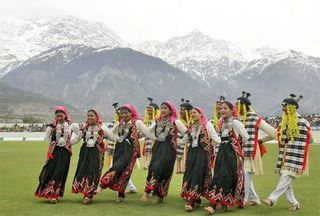Celebrations-marriages, the harvest, festivals, local fairs, social events are all occations for a spontaneous expressions of joy-a time when the cheerful hill people take time off from their labours to sing, dance and enjoy themselves. The lilt of the ballad fills the air and skirts swing to the rhythm.
The Naati of Kullu is a favourite dance where dancer link hands and move in steps to varying rhythms. Earlier danced only by the men attired in full splendour of their traditional costumes-swirling tunics and churidars sashes and decorated caps-the naati was an affair that lasted several hours. Today the women participate too and shorter version of the 13 style of the dance are performed.
Another group dance that is popular in thje state is Karthi, a kullu harvest dance performed in the open, in the light of an autumn moon. The Burah, a martial dance from Sirmaur, is performed with the waving of Dangras or axes to the accompaniment of the hurki. Balads recounting heroic battles and deeds are sung. The exhilarating Birsu and Ghugti from the upper Shimla hills are performed by the Khunds as they go to the local fairs. A martial people-they hold a sword, a dangra, a khukri or a handkerchief as they dance.
The nomadic Gaddis have a fine musical tradition too. Romantic ballads narrating the story of Kunju and Chanchlo, the Romeo and Juliet of Chamba valley, are sung late into the night as the men and women dance.
Kinnaur is famous for its folk dances-Kayang, where men and women dance in semi circle around the musians and the bonyangchu, a care free dance performed by the men. The bakayang danced by the beautifull Kinnauri women, resplendent in layers of silver jewellery, presents a splendid spectacle.
Fescinating masked dance dramas are also performed in the Jubbal and Rohru valley of Shimla known as sih and bura, they narrate stories and romantic and satiriecal themes that have been handed doen orally from generation to generation.




 Posted in:
Posted in:
0 comments:
Post a Comment